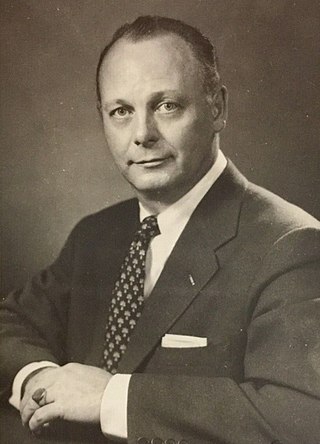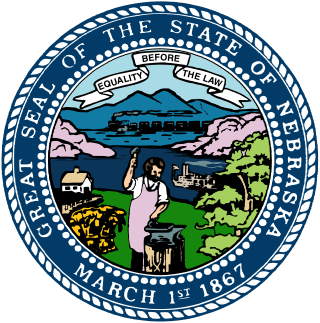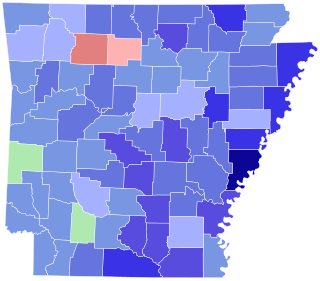
Frederick Andrew Seaton was an American newspaperman and politician. He represented the U.S. state of Nebraska in the U.S. Senate and served as U.S. Secretary of the Interior during Dwight D. Eisenhower's administration.

The 1958 United States Senate elections were elections for the United States Senate which occurred in the middle of President Dwight D. Eisenhower's second term. Thirty-two seats of Class 1 were contested in regular elections, the new state of Alaska held its first Senate elections for its Class 2 and 3 seats, and two special elections were held to fill vacancies.

The 2014 Arizona gubernatorial election was held on November 4, 2014, to elect the governor of Arizona, concurrently with elections to the United States Senate in other states and elections to the United States House of Representatives and various state and local elections.

The 1958 United States Senate election in Wyoming took place November 4, 1958. Incumbent Republican Senator Frank A. Barrett ran for re-election to his second term. He was challenged by Gale W. McGee, a University of Wyoming professor and the Democratic nominee. Despite the state's strong Republican lean, McGee ran an energetic campaign against Barrett, earning the support of the national Democratic establishment. McGee ultimately narrowly upset Barrett, winning 51% of the vote to Barrett's 49%.

United States gubernatorial elections were held on November 8, 2022, in 36 states and three territories. As most governors serve four-year terms, the last regular gubernatorial elections for all but two of the seats took place in the 2018 U.S. gubernatorial elections. The gubernatorial elections took place concurrently with several other federal, state, and local elections, as part of the 2022 midterm elections.

The 1974 Nebraska gubernatorial election was held on November 5, 1974, and featured incumbent Governor James Exon, a Democrat, defeating Republican nominee, state Senator Richard D. Marvel. Independent state Senator Ernie Chambers also captured 5% of the vote as a write-in candidate. This was the first gubernatorial election in Nebraska in which the nominees for Governor and Lieutenant Governor ran as a single ticket in the general election, though they were chosen in separate primary elections.

The 1970 Nebraska gubernatorial election was held on November 3, 1970, and featured businessman James Exon, a Democrat, defeating incumbent Republican governor Norbert Tiemann.

The 1964 Nebraska gubernatorial election was held on November 3, 1964, and featured incumbent Governor Frank B. Morrison, a Democrat, defeating Republican nominee, Lieutenant Governor Dwight W. Burney, to win a third and final two-year term in office.

The 1960 Nebraska gubernatorial election was held on November 8, 1960, and featured attorney and frequent political candidate Frank B. Morrison, a Democrat, defeating Republican nominee, state Senator John R. Cooper.

The 1956 Nebraska gubernatorial election was held on November 6, 1956, and featured incumbent Governor Victor E. Anderson, a Republican, defeating Democratic nominee, former state Senator Frank Sorrell, as well as independent George Morris, to win a second two-year term in office.

The 1950 Nebraska gubernatorial election was held on November 7, 1950, and featured incumbent Governor Val Peterson, a Republican, defeating Democratic nominee, former state Senator Walter R. Raecke, to win a third and final two-year term in office.

The 1948 Nebraska gubernatorial election was held on November 2, 1948, and featured incumbent Governor Val Peterson, a Republican, defeating Democratic nominee, former state Senator Frank Sorrell, to win a second two-year term in office.

The 1946 Nebraska gubernatorial election was held on November 5, 1946, and featured former school superintendent and newspaper publisher Val Peterson, a Republican, defeating Democratic nominee, state Senator Frank Sorrell.

The 1944 Nebraska gubernatorial election was held on November 7, 1944, and featured incumbent Governor Dwight Griswold, a Republican, defeating Democratic nominee, busboy George W. Olsen, to win a third and final two-year term in office.

The 1934 Nebraska gubernatorial election was held on November 6, 1934, and featured state engineer Robert L. Cochran, a Democrat, defeating Republican nominee, newspaper publisher and former state legislator Dwight Griswold.

The 1932 Nebraska gubernatorial election was held on November 8, 1932, and featured incumbent Governor Charles W. Bryan, a Democrat, defeating Republican nominee, newspaper publisher and former state legislator Dwight Griswold, to win a third and final two-year, non-consecutive term in office.

The 1930 Wisconsin gubernatorial election was held on November 4, 1930. Primary elections were held on September 16, 1930. Incumbent Republican Governor Walter J. Kohler Sr. was defeated in the Republican primary. Republican nominee Philip La Follette defeated Democratic nominee Charles E. Hammersley with 64.76% of the vote.

A general election was held in the U.S. state of Wyoming on Tuesday, November 8, 1910. All of the state's executive officers—the Governor, Secretary of State, Auditor, Treasurer, and Superintendent of Public Instruction—were up for election. Former U.S. Senator Joseph M. Carey won the gubernatorial election, securing the first Democratic win for Governor since 1892. Democratic candidates unseated Republican incumbents in the elections for Secretary of State and Superintendent of Public Instruction, and Republicans narrowly held open seats in elections for State Auditor and Treasurer.

The 1894 Arkansas gubernatorial election was held on September 3, 1894.

The 1956 Nebraska lieutenant gubernatorial election was held on November 6, 1956, and featured Speaker of the Nebraska Legislature Dwight W. Burney, a Republican, defeating Democratic nominee Frank B. Morrison who had been chosen to replace original Democratic nominee Stanley D. Long who had died during the campaign.












